Environmental sterility and effective disinfection have always been critical in clinical settings, but this year we all got a serious reminder of how dangerous airborne illnesses can be. In places where patients may have a compromised immune system - or at the very least, are there to improve their health, not to risk it - overall cleanliness has never been more important. It’s essential that the indoor air of hospitals and other health facilities are free of contaminants.
That’s because air that is not totally clean - or, air that contains particles - can cause or aggravate respiratory illnesses or further compromise patients suffering in other areas. Even worse, indoor air can transmit infectious diseases as well as bacteria, germs, and viruses. That’s especially dangerous for people with already delicate health - such as those in a hospital.
Breathe Easy with HEPA Filtration
HEPA stands for high-efficiency particulate air, and advanced medical offices know that HEPA filtration systems are extremely effective at capturing and removing airborne particles. HEPA filters can remove dust, pollen or fibers, and biological material such as viruses, bacteria, mold spores, fungi, bioaerosols and other contaminants.
How effective are HEPA filters? Nearly 100% efficient - at 99.9%. This means that health care settings can use them to significantly lower the risk of diseases transmitted through the air. What makes them particularly impactful is the fact that they work in two ways, on:
- Airborne sources - These are biological and inorganic contaminants that enter the building through normal doors and windows and through standard HVAC ventilation systems.
- Endogenous sources - These are contaminants that are transferred to the air by outside visitors, personnel, clothing, fresh fruit or flowers, supplies and packaging.
In most health care facilities or offices, you’ll find HEPA filtration systems in areas such as operating rooms, treatment rooms, testing and research laboratories, equipment rooms, compounding pharmacies, isolation rooms, infectious disease areas, and any other departments where clean air is especially vital.
The Most Effective HEPA Filtration
For the absolute best protection against contaminated air (which puts patients and clients at risk), medical and dental facilities should take a dual approach:
- A large-scale HEPA filter installed as part of their overall HVAC system
- Individual air purifier units with advanced HEPA filtration that can be placed in areas where additional cleaning is needed, or where vulnerable people are more likely to be.
There are many levels of HEPA efficiency, and most of the filters on the market work well as part of a larger HVAC system, capturing 95% of particles down to 0.1 microns. However - that’s not good enough in a healthcare setting. H13 Medical Grade HEPA, commonly referred to as “Medical Grade Filtration”, captures 99.9% of particles down to 0.1 microns.
Individual air purifiers are ideal for added protection in a medical grade setting. That’s because the number and size can be customized for your unique setting and building. Add them wherever additional air cleanliness is required, and move them around as needed. Since they are so portable, many hospitals and treatment centers simply move them from room to room based on occupancy.
Additionally, the filters are easier to change than those for larger HVAC systems. You can even join the Filter Club to have new filters delivered right to your door, just when you need them - at a discount. Finally, many medical grade settings choose an air purifier with UV filtration as well. This adds another layer of sterilization that many professionals find valuable.
The bottom line is that relying on your HVAC system for air cleanliness won’t cut it. Don’t put your patients or clients at risk by improperly filtering the air, especially during the COVID-19 pandemic. If you need help determining which units are best for your space, reach out to our experts.

